Israel’s concerns mount as Iran keeps accumulating highly enriched uranium that may enable it to produce weapon-grade uranium for 5-7 nuclear explosive devices within 3 months, and tests long-range ballistic missile while the international community continues its appeasement of the Iranian regime and attempts to reach a dangerous deal
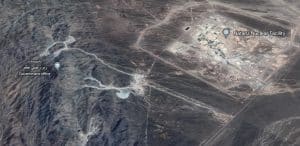
New satellite evidence suggests the excavation of a new underground nuclear facility near the existing Natanz nuclear site (Photo: Google Earth)
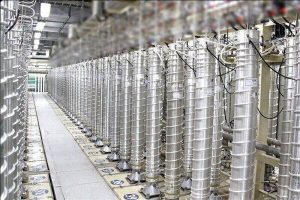
Natanz centrifuges as claimed by the Iranian media (Photo: Tehran Times)
Iran: Mounting concerns in Israel as H-Hour draws close
- According to a new report by the International Atomic Energy Agency (IAEA), Iran has accumulated 114 kg of 60% enriched uranium (26 kg more than 3 months ago) and 470 kg of 20% enriched uranium (36kg more than 3 months ago), on top of more than 4 tons of uranium enriched to more than 3.67% and 4.5%. This means that Iran is capable, at the moment of decision, to obtain a sufficient amount of 90% enriched uranium (military grade) for 2 nuclear devices within 2 weeks, and for 5-7 such devices within 3 months.
- In a news report by Al-Jadid (Qatar), it was revealed that Iran, Saudi Arabia, Oman and UAE are coming together under consultations with China to create a joint naval force in order to maintain security in the Persian Gulf. Rear Admiral Shahram Irani, Iranian Navy Commander, revealed that India and Pakistan would be involved in the upcoming venture.
- This announcement comes just 48 hours following the UAE withdrawal from a US-led maritime coalition that aimed to secure the crucial Gulf waterways essential to worldwide oil commerce.
- Israeli Defense Minister Yoav Galant has publicly disclosed an Iranian scheme of camouflaging floating IRGC naval bases as commercial ships. According to the Defense Minister, Tehran is transforming civilian merchant ships into vessels equipped with sophisticated attack and intelligence technology, turning them into potential terrorist strongholds situated in remote regions beyond Iran’s borders. The Minister stated that these bases are already in operation and functioning. One of them was spotted off the shores of Aden, Yemen.
- The ships, weighing hundreds of thousands of tons, are intended to store various weapons such as drones, missiles, and advanced attack and intelligence systems. It’s a calculated policy aimed at posing a constant menace threatening not only shipping routes but also the lives of civilians and military personnel. This piracy policy is alarming and must be urgently addressed.
- This new maritime menace is consistent with the type of threats emanating from Gaza, Lebanon, Syria, Judea, and Samaria, which are all interconnected. Iran is at the center of this web and poses a significant risk to global stability.
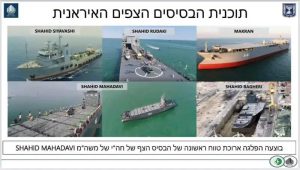
Floating Iranian IRGC military bases camouflaged as civilian commercial ships (Photo: Israeli Ministry of Defense)
- Israeli Chief of General Staff Lieut. Gen. Herzi Halevi has sent implicit threats toward Iran following the recent revelations. During the Reichmann University national security conference he said, “there are possible imminent negative developments [in Iran] that could trigger action. We have capabilities, as well as others.”
- The IAEA closes two of the probes against Iran’s nuclear activities: The International Atomic Energy Agency has declared the closing of two of the probes currently underway against Iran’s nuclear program – the undeclared site at Marivan, Abadeh county, Fars province revealed to the world, by Israeli Prime Minister Netanyahu in September 2019; and the uranium particles enriched to the level of 83.7% found around the Fordow facility. The Agency has confirmed Iran’s explanations as possible in the case of Marivan and satisfactory in the case of Fordow, however the Israeli Foreign Ministry slammed the decision regarding Marivan, saying it could have “extremely dangerous consequences” and that “the explanations provided by Iran … are not reliable or technically possible. Iran continues to fool the international community with no apparent consequences.”
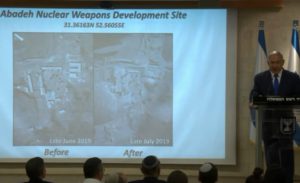
Israeli Prime Minister exposing the undeclared Marivan nuclear site in Abadeh district, Fars province in September 2019
- Newly published satellite pictures analyzed by the AP allegedly show a new underground facility under construction in the nuclear site of Natanz, Iran. This facility suffered major damage in the July 2020 explosion, which Israel was accused of initiating (no official responsibility was claimed). The analysis estimated how the new facility, unlike the existing ground-level one, is buried at least 80-100 meters underground and below a mountain, to better protect it from air strikes.
- Iran tested a new ballistic missile with a range of 2,000 km (May 25): Israel’s concerns were aggravated by the Iranian testing of the Khorramshhar-4 (Kheibar) long-range ballistic missile whose range can reach as far as 2,000 km (around 1,200 miles) and carry a 1,500kg warhead (3,300 lbs). It was unveiled during an event attended by Iranian Defense Minister Amir-Reza Ashtiani in a testing facility in the Semnan province.
- All of these developments come against the backdrop of credible reports of American-Iranian negotiations to renew the 2015 Nuclear Deal (JCPOA – Joint Comprehensive Plan of Action). According to reports, American sanctions will be immediately lifted in return for an Iranian commitment to maintain its current enrichment levels, without accumulating more highly enriched uranium and to avoid enriching uranium to a weapon-grade level.
- If realized, this “JCPOA 2.0” effectively puts an immediate dark cloud above the heads of Israel and the pragmatic Sunni world in the Middle East by allowing Iran to enjoy minimum sanctions while keeping the maximum of its nuclear assets. These Iranian gains come against the backdrop of continued weakening of the American posture in the Middle East. This concern led Israeli Prime Minister Netanyahu and the Israeli national security leadership to clarify their commitment to not allowing Iran to have a nuclear weapon and to intensify the dialogue with the US on this matter.
- For its part, Israel is working closely with the US to realize its objective of expanding the Abraham Accords and to formalize normalization, even potentially, a full peace agreement with Saudi Arabia, which would largely end the Israeli-Arab conflict and pull the Saudis back from Iranian hands. US Secretary of State Anthony Blinken and National Security Advisor Jake Sullivan have already clarified that Israeli-Saudi normalization remains a “top priority” for the US, while senior Israeli officials, including Prime Minister Netanyahu, Foreign Minister Eli Cohen, and National Security Advisor Tzhai Hanegbi all speak positively and publicly of such a prospect, with the appropriate caution.
- Any attempt to brush the Iranian issue under the rug in exchange for vague and unsubstantiated promises would be akin to admitting that the international community, and in particular the US and Europe, have given up on the idea of forcing Iran’s hand into giving up on its military nuclear program. Leaving the Iranian regime as a nuclear threshold state would be a game changer for the Middle East’s political alliances and shift the pendulum in Iran’s favor, explaining the recent political successes of the Iranian regime in the region.
Hezbollah: Large-scale military drill and an exchange of threats between Nasrallah and the Israeli security establishment
- While Iran was testing Israel’s patience, terrorist group Hezbollah’s Secretary General Hassan Nasrallah was brandishing his ability to harm Israel by holding public military exercises in southern Lebanon, simulating a ground invasion into Israel. Gilad Erdan, Israel’s ambassador to the UN, has formally lodged a complaint against Lebanon with the Security Council and the Secretary-General in response to these exercises, which go against two Security Council Resolutions – 1701 and 1559. The war games, held in the southern part of Lebanon just 19km (12 miles) from the Israeli border where UNSC resolution bans them from operating, were conducted by hundreds of Hezbollah militants, and simulated scenarios of sniper and drone attacks against Israeli targets, entering Israel and taking over outposts, as well as civilian hostage-taking.
- Following several months of increased tensions along the Israel-Lebanon border, (as covered in previous Israel Security Briefings) including rocket launching from Lebanon to Israel, the ground penetration of a Hezbollah terrorist and attempted drone launches, top officials from the Israeli security establishment including Chief of Staff Lieut. Gen. Herzi Halevi and Head of the Intelligence Corps Maj. Gen. Aharon Haliva voiced concerns and implicit threats toward Hezbollah and Iran during a conference at the Reichman University.
- Gen. Halevi estimated that “Hezbollah is to a large extent deterred by the notion of an all-out war. Their belief that they understand how we think lead them to challenge us, where they believe this would not lead to war. I consider this a good track for initiating surprises when needed.” He added, “our readiness for fighting in the north is improving by the day. Having said that, while the Israeli home front could suffer a major blow by such a campaign, it will be seven times harder for Lebanon. Lebanon will have a hard time emerging [from such a war].”
- Gen. Haliva estimated that Iran has “not yet made the decision to break out to a bomb”, and said “Iran’s threat on Israel has become direct, and it parks in many arenas”. He added, “Iran has made a negative entrance into 2023 against the backdrop of the protests and the supply of arms to Russia”.
- Maj. Gen. Haliva voiced concerns on Hezbollah’s growing confidence, saying that even 17 years after the “mistake” of triggering the Second Lebanon War, Nasrallah “begins to understand that the old formulas vis-à-vis Israel can gradually be stretched,” and that he is “close to making a mistake that could spark a regional war.” He warned, “make no mistake, we are prepared to use force. Opening fire both from Lebanon and Syria could lead to escalation and an extremely large-scale collision between Israel and Hezbollah as well as Lebanon.”
- In response, Hezbollah Secretary General Hassan Nasrallah threatened: “You are not those to threaten with war, we are the ones who threaten you. Any such war will involve all of Israel’s borders.” He added, “the Resistance Axis is extremely cohesive, in Gaza, in Jerusalem, in the West Bank and in the rest of the region.”
- In parallel, the IDF has launched a large-scale military drill dubbed “Decisive Blow” planned to take two weeks, simulating a multi-front war. Gen. (res) Amir Aviv, IDSF’s Chairman and Founder, explained how “for years, the IDF has benefited from wars focusing on just one front. Now, for the first time in years, the IDF is coping with a multi-front challenge stretching throughout the Middle East, from Iran, through several complicated fronts in the North – Lebanon and Syria – alongside Judea and Samaria, as well as traumatic scenarios of domestic riots along the lines of the 2021 Operation Guardian of the Walls. We are closer than ever to such a scenario.” IDSF Executive Board Member, Maj. Gen. Gershon Hacohen is leading the drill.
- The Israeli press has reported that the political echelon looks favourably on a surprise attack against Hezbollah in Lebanon in order to eliminate a significant Iranian asset that threatens the Israeli home front.
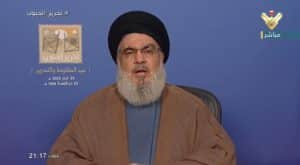
Hezbollah Secretary General Hassan Nasrallah responds to statements made by senior Israeli officials on Hezbollah’s official TV, Al-Manar
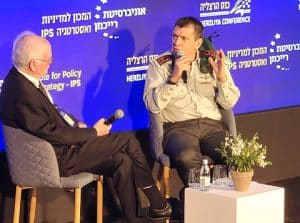

Israeli Head of Intelligence Corps, Maj. Gen. Ahron Haliva, making statements on Hezbollah during the Reichmann University conference (Photo: IPS)
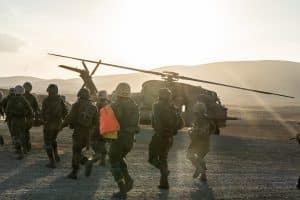
Israeli soldiers during a military drill (Photo: IDF Spokesperson)
Official visit: Israeli President Isaac (“Bougie”) Herzog made a state visit to Azerbaijan.
- President Herzog met (May 30) his Azeri counterpart Ilham Aliyev in Baku, signing health-related bilateral agreements and strengthening the quietly-forming Israeli-Azeri-Turkish axis vis-à-vis The first Israeli embassy in Azerbaijan was also inaugurated. The Iranian topic was reportedly front and center during the visit, while other security-related topics were discussed as part of the deepening Israeli-Azeri ties, alongside cooperation in the areas of agriculture, energy, cyber, and tourism.
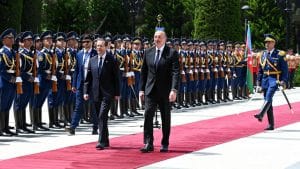
Israeli President Isaac (“Bougie”) Herzog made an official state visit to Baku, Azerbaijan, meeting his counterpart Azeri President Ilham Aliyev. The Iranian topic was reportedly front and center during the visit
The Palestinian Arena: Mahmoud Abbas calls to delegitimize Israel at the UN podium | Israeli security establishment abides by the status quo vis-à-vis the Palestinian Authority
- Chairman of the Palestinian Authority and the Fatah Movement, Mahmoud Abbas, was invited to the United Nations for the first-of-its-kind so-called “Nakba” event to commemorate the Palestinian claim that many Palestinians vacated Israel during the 1948-1949 War of Independence. Despite much evidence suggesting that Arab leaders urged Palestinians to leave their homes voluntarily in hopes of returning victorious a few months later (which did not materialize), alongside the broader context of a similar number (800 thousand – 1 million) of Jewish refugees fleeing Arab countries into Israel and a much larger number of tens of millions of refugees from Eastern Europe and between India and Pakistan during that same period, the United Nations has only chosen to focus on Palestinian refugees.
- It should be noted that Palestinian refugees are singularly and separately treated by UNRWA, a UN agency often accused of “eternalizing the conflict” rather than finding solutions to refugees, unlike all other refugee groups around the world, treated under the UNHCR. For example, unlike all other refugee groups, UNRWA considers offsprings of the original refugees as refugees themselves, essentially “inherited refugeeship”, as well as their non-Palestinian spouses and residents of Israel as refugees.
- Palestinian Chairman Abbas has accused Israel of crimes while using Nazi-like tropes, slanderous superlatives and exaggerations, and called upon the UN to enact sanctions against Israel and freeze its UN membership. “They continue to lie like Goebbels [Nazi Germany’s Propaganda Minister],” claimed Abbas. Meanwhile, Israeli Ambassador to the UN Gilad Erdan acted successfully to convince multiple countries to boycott the event.
- On the other hand, Israeli Chief of General Staff Lieut. Gen. Herzi Halevi reiterated the long-standing position by the Israeli security establishment of abiding by the status quo. During the Reichmann University conference he stated, “a functioning Palestinian Authority is preferable over chaos in the streets or a scenario where Hamas takes power.”
- However, this position by the Israeli establishment disregards the way Israel is being weakened by its lack of willingness to tackle the strategic threat increasingly posed by the PA, including the disregard for the PA’s Pay for Slay policy (incentivizing terrorists to murder Israelis by promising up-front monthly payments to any terrorist), its diplomatic warfare in international forums, its support for delegitimization organizations such as BDS, as well as the reality unfolding in recent years, that the PA, much like the former Western-backed government in Afghanistan, has lost its grip over much of its supposed territory – the Gaza Strip, Jenin, Nablus, Hebron and other major cities.
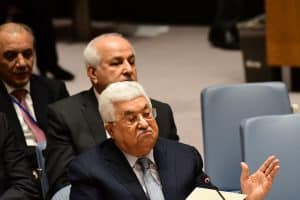
Chairman of Palestinian Authority, Mahmoud Abbas (Photo: Shutterstock)
THE MONITOR: H2 May 2023 in numbers
ISRAELI TERROR VICTIMS
1 killed victim – shooting attack
1 wounded officer – counterterrorism operation
- May 25, during Shavuot / Pentecost holiday | Tene Omarim, north to Beer Sheva. Alla Qishi’a, an armed Palestinian man penetrated the Israeli community in order to harm local civilians, was documented on CCTV footage as he crawled under the town’s main gateway holding a knife. He made it several hundreds of meters into the town and was subsequently tracked and killed by a member of the town’s security squad.
- May 30 | Roads of Samaria. 5 Palestinians attacked with live ammunition an Israeli man named Meir Tamari, an Israeli who was driving his car, adjacent to the town of Hermesh. They shot at him from their position on the road’s shoulders. Tamari continued driving to the entrance of the town, but the medical teams were unable to save him, and declared his death shortly afterwards. He left a widow and two young children.
ON THE PALESTINIAN SIDE
- May 22 | Balata Refugee Camp | Counterterrorism raid by the IDF to arrest suspects. During the raid, IDF combatants located a lab containing large quantities of explosives with a total weight of dozens of kilograms, designated for terror attacks inside Israel. The soldiers were attacked by local militants, causing heavy riots. As a result, one Israeli officer was wounded and 3 militants from the Al Aqsa Brigades terrorist group were killed.
- May 29 | Jenin Refugee Camp | Counterterrorism raid by the IDF to arrest suspects. During the raid, the soldiers located armament and stolen military equipment designated to target Israeli civilians. Local militants attacked the soldiers with heavy fire and threw improvised explosive devices (IEDs) at them, and the force fired back.
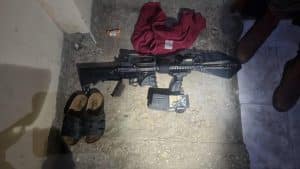
Deadly armament stored by Palestinian militants and caught the by IDF during a counterterrorism raid in the Balata refugee camp | May 21 (Photo: IDF spokesperson)
TECHNOLOGY, BUSINESS & ARMS DEALS
- May 29-31 | The Calcalist Economic Summit was held in Tokyo, in partnership with the Israel Discount Bank, CTech and Discount Tech. It gathered both Israeli and Japanese investors, economists and innovators from the start-up sector, as well as 16 founders and CEOS of Israeli start-ups selected to present their companies. During the conference, Japanese Prime Minister Fumio Kishida congratulated the strengthening of Israeli-Japanese economic ties, saying “in both countries, human resources are the main resource.” The event marked 70 years to the launching of diplomatic ties between Israel and Japan. This year, bilateral commerce has reached $4 bn USD annually, and Japanese companies invested a total of $13 billion USD in the Israeli Hi Tech sector since the year 2000. 13% of foreign investments in Israel come from Japan.